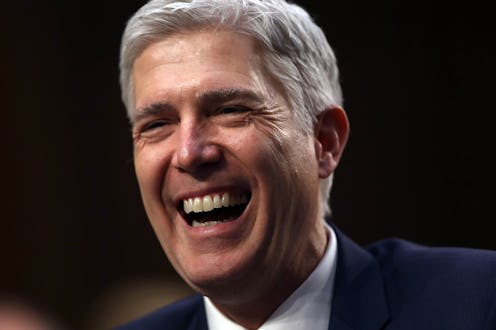News
Democrats Have Filibustered Neil Gorsuch

Sticking to their pledge to do so, Senate Democrats on Thursday sustained a filibuster against Donald Trump's Supreme Court nominee, Neil Gorsuch. The final vote to end debate (which requires 60 votes) ended up at 55-45. All but one Republican voted to move forward with the confirmation vote, and all but four Democrats opposed.
Democrats have argued a combination of process and policy as rationale for this choice. They have claimed that the seat is not legitimately Trump's to fill after Republicans refused to even hold a hearing on President Obama's nominee, Merrick Garland, for the same seat for almost a year. Some Democrats have also pointed to Gorsuch's alleged history of siding with big business agains the little guy (including a controversial case where he ruled a trucker could be fired for abandoning his trailer when freezing to death) make him a bad choice for the court.
The Gorsuch filibuster is the first filibuster of a Supreme Court nominee since President Lyndon Johnson's attempt to replace Chief Justice Earl Warren in 1968 with Abe Fortas. It also may be the last filibuster of a Supreme Court nominee: Senate Majority Leader Mitch McConnell has vowed to change the Senate rules and eliminate filibusters for Supreme Court nominees as a response to the Democratic filibuster.
The end of the Supreme Court filibuster is the cap on years of escalating partisan brinkmanship over Supreme Court nominations. Whereas in decades past, qualified nominees would be confirmed with bipartisan majorities, both sides have escalated the stakes as U.S. politics have become more polarized.
In 2005, Democrats attempted a filibuster of Bush nominee Samuel Alito, but eventually backed down. During the Obama administration, Republicans filibustered an historic number of judicial nominees, leading to Democrats eliminating the filibuster for lower court appointments in 2013. And in 2016, Republicans refused to even consider an Obama appointee to the bench after Justice Antonin Scalia died last February.
Even as Republicans take the next step to change the rules and end the power of minority parties to have any say in Supreme Court nominations, many among them have expressed regret that the Senate has become so partisan. Sen. John McCain has called the end of the Supreme Court filibuster "a dark day in Senate history" (after pledging during the election to block Hillary Clinton from nominating anyone to fill the court seat if she won). This hasn't stopped those same Republicans from moving forward with the change to the Senate rules they lament. Shortly after the Democratic filibuster, Republicans employed the "nuclear option" of changing the rules to let Gorsuch's confirmation proceed with a simple majority.
Since Gorsuch is considered to be ideologically similar to Antonin Scalia, the judge he is replacing, the balance of the highest court in the United States will not significantly change. But the behavior of the highest legislative body almost certainly will.